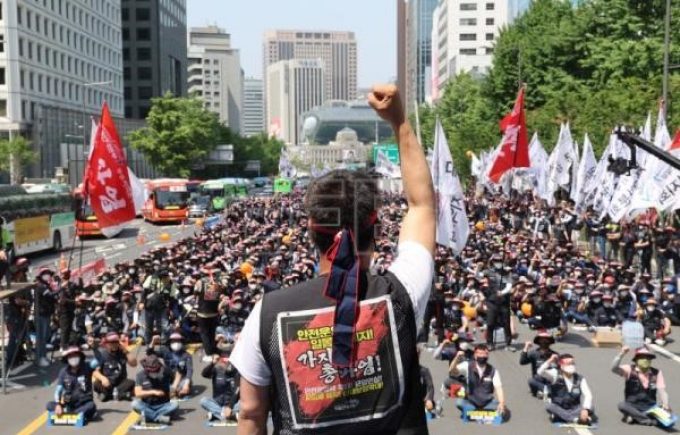Unions renew call for industrial action at France’s biggest box port
Docker and port worker unions at France’s biggest container port, Le Havre, have begun a ...

South Korea is counting the economic costs of the fallout from the intensifying truckers’ strike, which is continuing for a third day as South Korea’s largest port in Busan reported a major decline in cargo movements.
Unionised truckers, including cement mixers and car-carrying trailers, have stopped work while non-unionised drivers have not shown up for work in fear of reprisals from their trade union colleagues.
The steel, auto and cement factories have mostly suspended shipments due to difficulties in moving their cargoes.
The ...
Keep our news independent, by supporting The Loadstar
Volume surge and an early peak season? 'Don't celebrate too soon,' warning
Container spot rates diverge: to Europe still falling, but firmer to the US
Hapag-Lloyd won't take bookings if port congestion leaves cargo stranded
Ecommerce likely the front-runner in resurge of transpacific trade after deal
China-US trade tariff pause could drive a rebound for transpacific rates
Service chaos from trade ban with India a problem for Pakistan shippers
Airfreight rates ex-China 'loss-making', but hopes of a trade deal stay high
Carriers impose 'emergency operation' surcharges on Pakistan cargo
Serious threat to jobs in US logistics as tariffs cause economic 'stagflation'
Shippers should check out the 'small print' in China-US tariff cuts
15% rebate for box ships as Suez Canal Authority woos carriers
White House u-turns see freighters flying but keep logistics players on their toes
MSC in terminal switch as Nhava Sheva gets strong start to new fiscal year
Peak season or recession? Forwarders and shippers need to 'stay flexible'
Volga-Dnepr claims 'pirate' Canada has 'hijacked' its stranded aircraft


Comment on this article